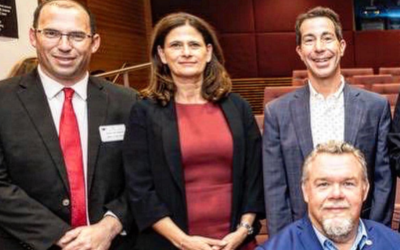How Israeli spy tech reaches deep into our lives
 Israeli software used on Palestinians is producing new cyber weapons that are rapidly being incorporated into global digital platforms
Israeli software used on Palestinians is producing new cyber weapons that are rapidly being incorporated into global digital platforms
Digital age weapons developed by Israel to oppress Palestinians are rapidly being repurposed for much wider applications – against Western populations who have long taken their freedoms for granted.
Israel’s status as a “startup nation” was established decades ago. But its reputation for hi-tech innovation always depended on a dark side, one that is becoming ever harder to ignore.
Jeff Halper warned that Israel had achieved a pivotal role globally in merging new digital technologies with the homeland security industry. The danger was that gradually we would all become Palestinians.
Israel, he noted, treated the millions of Palestinians under its unaccountable, military rule effectively as guinea pigs in open-air laboratories. They were the test bed for developing not only new conventional weapons systems, but also new tools for mass surveillance and control.
As a recent report in Haaretz observed, Israel’s surveillance operation against Palestinians is “among the largest of its kind in the world. It includes monitoring the media, social media and the population as a whole ».
Big Brother trade
But what began in the occupied territories was never going to stay in the West Bank, East Jerusalem and Gaza. There was simply too much money and influence to be gained from a trade in these new hybrid forms of offensive digital technology.
Tiny though it may be in size, Israel has long been a world leader in an extremely lucrative arms trade, selling to authoritarian regimes around the world its weapons systems as “battlefield-tested” on Palestinians.
This trade in military hardware is increasingly being overshadowed by a market for belligerent software: tools for waging cyber warfare.
Such new-age weapons are in high demand from states for use not only against external enemies, but against internal dissent from citizens and human rights monitors. Israel can rightly claim to be a world authority here, controlling and oppressing populations under its rule. But it has been keen to keep its fingerprints off much of this new Big Brother technology, by outsourcing the further development of these cyber tools to graduates of its infamous security and military intelligence units.
Nonetheless, Israel implicitly sanctions such activities by providing these firms with export licenses – and the country’s most senior security officials are often closely involved in their work.
Mobile phone ‘spy kit’
In a sign of the tensions, WhatsApp, a social media platform owned by Facebook, initiated the first lawsuit of its kind in a California court last week against NSO, Israel’s largest surveillance company.
WhatsApp accuses NSO of cyber attacks. In just a two-week period ending in early May examined by WhatsApp, NSO is reported to have targeted the mobile phones of more than 1,400 users in 20 countries.
NSO’s spyware, known as Pegasus, has been used against human rights activists, lawyers, religious leaders, journalists and aid workers. Reuters revealed last week that senior officials of US allies had also been targeted by NSO.
After taking charge of the user’s phone without their knowledge, Pegasus copies data and turns on the microphone for surveillance. Forbes magazine has described it as the “world’s most invasive mobile spy kit”.
NSO has licensed the software to dozens of governments, including prominent human rights-abusing regimes such as Saudi Arabia, Bahrain, the United Arab Emirates, Kazakhstan, Mexico and Morocco.
Ties to Israeli security services
NSO was founded in 2010 by Omri Lavie and Shalev Hulio, both reported to be graduates of Israel’s vaunted military intelligence Unit 8200.
In 2014, whistleblowers revealed that the unit routinely spied on Palestinians, trawling through their phones and computers for evidence of sexual improprieties, health problems or financial difficulties that could be used to pressure them into collaborating with Israel’s military authorities.
Tracked by cameras
In the same week that WhatsApp launched its legal action, US television channel NBC revealed that Silicon Valley is nonetheless keen to reach out to Israeli startups deeply implicated in abuses associated with the occupation.
Microsoft has invested heavily in AnyVision to further develop sophisticated facial recognition technology that already helps the Israeli military oppress Palestinians.
The connections between AnyVision and the Israeli security services are barely hidden. Its advisory board includes Tamir Pardo, former head of Israel’s Mossad spy agency. The company’s president, Amir Kain, previously served as head of Malmab, the defence ministry’s security.
AnyVision’s main software, Better Tomorrow, has been nicknamed “Occupation Google” because the firm claims it can identify and track any Palestinian by searching footage from the Israeli army’s extensive network of surveillance cameras in the occupied territories.
Despite obvious ethical problems, Microsoft’s investment suggests it may be aiming to incorporate the software into its own programmes. That has caused grave concern among human rights groups.
Shankar Narayan of the American Civil Liberties Union warned of a future all too familiar to Palestinians living under Israeli rule: “Face recognition is possibly the most perfect tool for complete government control in public spaces.”
A former AnyVision employee told NBC that the Palestinians were treated as a testing ground. “The technology was field-tested in one of the world’s most demanding security environments and we were now rolling it out to the rest of the market,” he said.
Meddling in elections
The Israeli government itself has a growing interest in using these spying technologies in the US and Europe, as its occupation has become the focus of controversy and scrutiny in mainstream political discourse.
In the UK, the shift in the political climate has been highlighted by the election of Jeremy Corbyn, a long-time Palestinian rights activist, to head the opposition Labour Party. In the US, a small group of lawmakers visibly supportive of the Palestinian cause have recently entered Congress, including Rashida Tlaib, the first Palestinian-American woman to hold the post.
More generally, Israel fears the flourishing international solidarity movement BDS (boycott, divestment and sanctions), which calls for a boycott of Israel – modelled on the one against apartheid South Africa – until it stops oppressing Palestinians. The BDS movement has grown strongly on many US campuses.
As a result, Israeli cyber firms have been drawn ever more deeply into efforts to manipulate public discourse about Israel, apparently including by meddling in foreign elections.
Psy-Group, which marketed itself as a « private Mossad for hire », was shut down last year after the FBI began investigating it for interfering in the 2016 US presidential election. Its « Project Butterfly”, according to the New Yorker, aimed to “destabilize and disrupt anti-Israel movements from within”.
Adapted from: https://www.middleeasteye.net/opinion/how-hand-israeli-tech-reaches-deep-our-lives
Distributed by PAJU (Palestinian and Jewish Unity)
PAJUMONTREAL.ORG/EN






